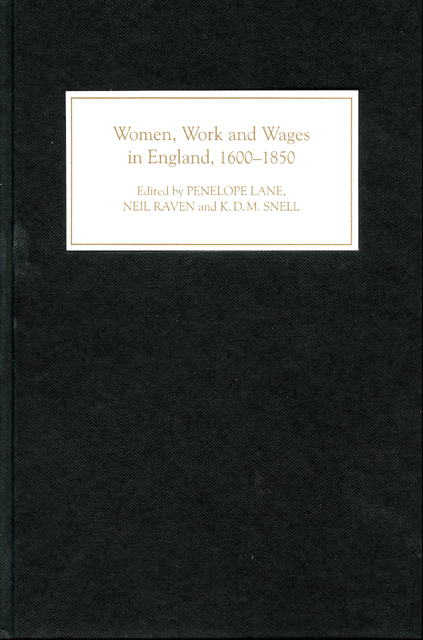Book contents
- Frontmatter
- Contents
- Illustrations
- Notes on Contributors
- Acknowledgements
- Introduction
- 1 ‘Waste’ Children? Pauper Apprenticeship Under the Elizabethan Poor Laws, c. 1598–1697
- 2 Gender at Sea: Women and the East India Company in Seventeenth-Century London
- 3 Sickles and Scythes Revisited: Harvest Work, Wages and Symbolic Meanings
- 4 A Customary or Market Wage? Women and Work in the East Midlands, c. 1700–1840
- 5 ‘Meer Pennies for My Baskitt Will be Enough’: Women, Work and Welfare, 1770–1830
- 6 Caring for the Sick Poor: Poor Law Nurses in Bedfordshire, c. 1770–1834
- 7 ‘A ‘Humbler, Industrious Class of Female’: Women’s Employment and Industry in the Small Towns of Southern England, c. 1790–1840
- 8 A Diminishing Force? Reassessing the Employment of Female Day Labourers in English Agriculture, c. 1790–1850
- Bibliography
- Index
6 - Caring for the Sick Poor: Poor Law Nurses in Bedfordshire, c. 1770–1834
Published online by Cambridge University Press: 21 March 2023
- Frontmatter
- Contents
- Illustrations
- Notes on Contributors
- Acknowledgements
- Introduction
- 1 ‘Waste’ Children? Pauper Apprenticeship Under the Elizabethan Poor Laws, c. 1598–1697
- 2 Gender at Sea: Women and the East India Company in Seventeenth-Century London
- 3 Sickles and Scythes Revisited: Harvest Work, Wages and Symbolic Meanings
- 4 A Customary or Market Wage? Women and Work in the East Midlands, c. 1700–1840
- 5 ‘Meer Pennies for My Baskitt Will be Enough’: Women, Work and Welfare, 1770–1830
- 6 Caring for the Sick Poor: Poor Law Nurses in Bedfordshire, c. 1770–1834
- 7 ‘A ‘Humbler, Industrious Class of Female’: Women’s Employment and Industry in the Small Towns of Southern England, c. 1790–1840
- 8 A Diminishing Force? Reassessing the Employment of Female Day Labourers in English Agriculture, c. 1790–1850
- Bibliography
- Index
Summary
For many of the poor, in the rural south and east of England in particular, provision of poor relief under the old poor law was generous and widely encompassing. The keystone of the poor law was the provision of weekly or monthly pensions to the aged, unmarried mothers, widows, the sick, the disabled and the orphaned. Allowances were available to those with large families or whose wages were too low for subsistence. Occasional sums of cash and gifts in kind, such as fuel, bedding, clothing, food and alcoholic beverages, and rent or lodging payments, were given to a wide variety of people. Medical poor relief was an integral part of this provision. Such assistance encompassed institutional relief in hospitals, lunatic asylums, private madhouses and workhouses, and assistance at home from doctors, midwives, bone-setters, inoculators and nurses. The poor could consult the local doctor, who, by the late eighteenth century, was increasingly paid for under an annual contract to provide most of the medical needs of the poor. Doctors provided assistance and medicines, such as mixtures, ointments, draughts, drops, powders and blisters. The parish also provided domiciliary care; when they were too sick or infirm, paupers were helped in a range of tasks, from housework and laundry to skilled nursing and assistance at childbirth, and were nursed, either back to health or in their final days, by parish carers and nurses.
During the eighteenth and early nineteenth centuries, the poor law was the main source of local medical assistance for the poorest part of society, both in the short term and the long term. Sickness and accidents usually involved increased outlay on food, medicines and care, while the associated unemployment meant a temporary loss of income, and many labouring families were unable to cope without parish assistance. Medical relief was also extended to those whose savings might have seen them through a short illness but did not amount to the payment of doctors’ bills. For others, chronic illness or prolonged infirmity necessitated a much longer period of dependency upon the poor law. However, while there is ample evidence from hospitals and infirmaries, little is known about medical provision for paupers in their own homes.
- Type
- Chapter
- Information
- Women, Work and Wages in England, 1600-1850 , pp. 141 - 169Publisher: Boydell & BrewerPrint publication year: 2004
- 2
- Cited by



